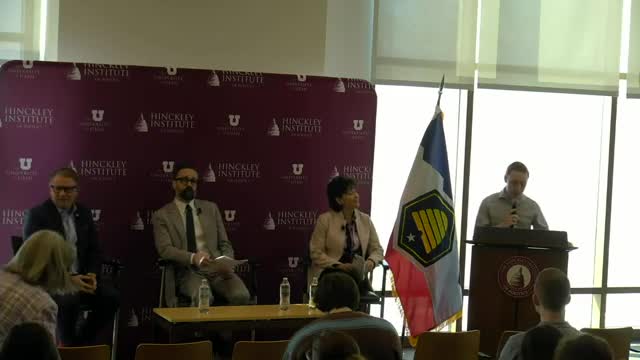Utah higher-education leaders prepare reinvestment plans as legislature eyes 10% cut
Get AI-powered insights, summaries, and transcripts
Subscribe
Summary
University of Utah and Utah System of Higher Education leaders told a Hinckley Institute forum they are preparing data-driven reinvestment plans and shared-service models in response to a proposed 10% budget cut and reallocation the legislature has signaled it will pursue.
University of Utah President Taylor Randall, Provost and Senior Vice President for Academic Affairs Mitzy M. Montoya and Jeffrey Landward, Commissioner of Higher Education, said at a Hinckley Institute of Politics forum that they have begun planning for a probable legislative 10% cut and a reallocation of state funding intended to reward programs tied to measurable student success and workforce demand.
"We all actually care deeply about student success," Commissioner Jeffrey Landward said, describing negotiations with legislative leaders as focused on getting the best return on state investment. He added that "never once has there been a situation where the suggestion was that the investment isn't worth it."
The panelists said they view the legislature's attention as an opportunity to redesign investments rather than simply trim budgets. "This is a reallocation," President Taylor Randall said, framing the process as a chance to move funds into programs and supports that demonstrably improve graduation, wage outcomes and employment in growth industries.
Why it matters: panelists said any reallocation will affect academic program offerings, student support services and administrative structure across Utah’s 16 public higher-education institutions. They warned that decisions must preserve students' ability to complete degrees (teach-out periods) and that some changes — such as shared services or regional program consolidation — could change where programs are offered even if access is maintained statewide.
How leaders plan to respond
Mitzy M. Montoya said the University of Utah has expanded its academic enterprise planning tools to be more data informed, adding algorithms and market data to measure student demand and employer needs. "This request from the legislature and this expectation is that it's a it's a request for accountability and transparency," she said, describing new decision-intelligence tools the university will use to align programs with labor-market signals.
Commissioner Landward said the system office and campus leaders are developing objective criteria — enrollment, employment and wage outcomes, current and projected industry demand, and statewide strategic priorities — for institutions to use when drafting reinvestment plans. He said the system expects institutions to produce defensible rationales showing where cuts occurred and where reinvestments will be made.
Leaders emphasized that reinvestment criteria should not be determined entirely by the legislature. Landward said the system is asking for trust to let campus leaders, who understand local missions and constraints, apply consistent data to decide which programs to retain, revise or combine.
Preserving breadth and supports
Randall stressed the University of Utah’s role as a Research 1 university and said it will try to protect broad liberal-arts and arts programs while expanding career-development investments across majors. He cited a recent campus effort to raise scholarship funds and signaled plans to expand housing-related support for students, noting that housing costs can be a larger barrier than tuition.
Montoya and Randall both pointed to non-classroom investments — advising, counseling and career services — as critical to completion outcomes and eligible for reinvestment attention.
Shared services and regional models
Panelists described shared-service pilots in Weber and Davis counties, where a regional model lets a larger institution (Weber State University) provide administrative services to smaller technical colleges (Davis Technical College, Ogden–Weber Technical College) to capture economies of scale for IT, HR and finance. Landward said such models could reduce administrative costs passed on to students and taxpayers, and could make cybersecurity protections more affordable for smaller campuses.
Research and statewide impact
The commissioners and university leaders urged clearer state recognition of the distinct mission of research universities. They pointed to ongoing research efforts, including a multidisciplinary Great Salt Lake strike team, as examples of how campus research can inform policymaking and long-term state resilience.
Audience questions
During a student Q&A, panelists discussed cultural and political obstacles to alternative revenue (one student asked about a state lottery) and described campus efforts to reduce polarization, including a task force on viewpoint diversity, training in constructive dialogue and a new campus dialogue manager position.
What was not decided
The forum did not record any formal legislative proposals or votes. Panelists repeatedly said a bill had not yet been filed and that details — specific criteria, exact program lists and legal deadlines — were not specified at the time of the forum.
Ending
Speakers urged transparency and data-driven justifications for any cuts and reinvestments. They said the next weeks of the legislative session will determine concrete requirements, and institutions are aiming to deliver plans that are defensible to both the public and legislators.
